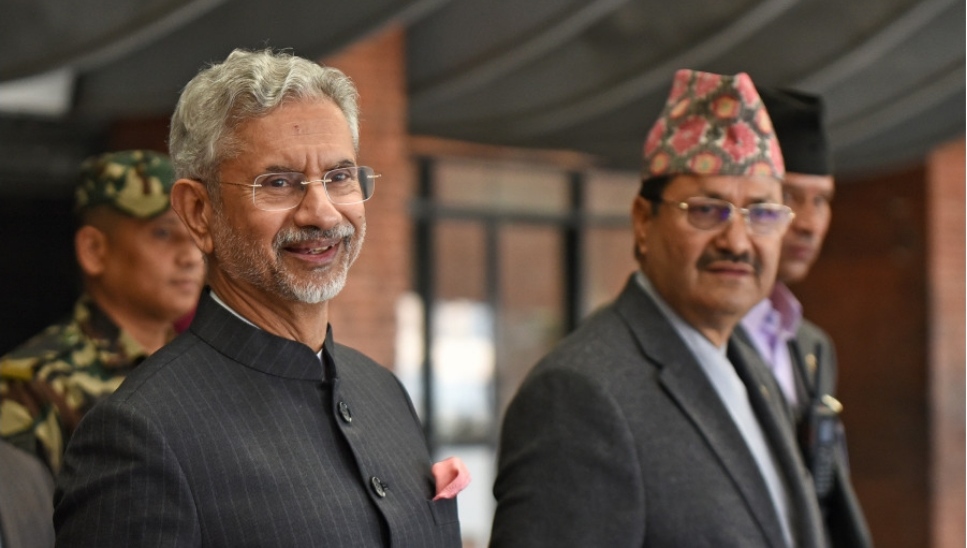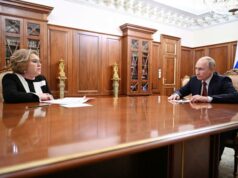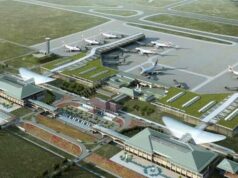Jaishankar in Nepal : Some big deals and a little controversy

By Anil Giri
Opposition leaders rap decision to allow Indian funding for small projects saying that it violates constitution.External Affairs Minister of India S Jaishankar (left) and Foreign Minister NP Saud at the Tribhuvan International Airport, Kathmandu.
Before wrapping up his 26-hour visit to Kathmandu, Indian External Affairs Minister S Jaishankar made a meaningful remark in Kirtipur on Friday while inaugurating the Tribhuvan University’s new library building, which was funded by the government of India.
“Under the leadership of Prime Minister [Narendra] Modi, the government of India is committed to continue to redefine its relationship with partners in our neighbourhood, especially with Nepal,” Jaishankar said.
After Modi came into power in 2014, India adopted the policy of “Neighborhood first”, and according to India’s Ministry of External Affairs, Nepal is a priority partner of India under this policy.
“In recent years, we have witnessed the real transformation of India-Nepal relations,” said Jaishankar. “This partnership has expanded multifold, and connectivity—physical, digital, and energy-related—has become the cornerstone for this expanding collaboration.”
Jaishankar was in Kathmandu to co-chair the seventh meeting of the Nepal-India Joint Commission, where four agreements were signed and the foreign ministers of Nepal and India inaugurated three cross-border transmission lines.
Jaishankar also met former prime ministers including Sher Bahadur Deuba, KP Sharma Oli, Madhav Kumar Nepal, and leaders of several Madhes-based parties.
Unlike in the past, he did not spend much time inquiring about the domestic politics of Nepal, but stated that the ruling alliance would complete its full term, according to a leader.
But his visit was not free from controversy.
The renewal of the agreement on the implementation of High Impact Community Development Projects (HICDPs), formerly known as “small development projects” has sparked debate, with a section of political leaders and civil society members expressing concerns about allowing India to invest up to Rs200 million per project through ‘lax vetting process’.
The main opposition CPN-UML has opposed the decision saying the government did not consult it.
But Foreign Minister NP Saud, talking to the Post, defended the extension of the terms and conditions of HICDPs saying it was done by following the same guidelines and modality used when the Nepal Communist Party—which has now broken into CPN-UML and CPN (Maoist Centre)—was in power in 2019.
“We have allowed the per project budget increase from Rs50 million to Rs200 million as it will benefit the country. The guidelines, modality, and the terms of reference remain the same as those prepared by the 2019 Oli government,” said Saud.
The then Oli government amended some provisions of the “small grant project” in 2019 as the constitution of Nepal bars local and provincial units from directly seeking funds and projects from donors.
Prime Minister Pushpa Kamal Dahal, speaking at a parliamentary committee on Friday, defended the government’s decision to increase the budget for small projects from Rs50 million to 200 million.
“The government of Nepal should set up counter funds on the small grant projects,” the prime minister said. “The projects will be implemented through joint investment and decision-making.”
He also pointed out that India alone cannot decide to invest in HICDP projects.
But UML Deputy General Secretary and former foreign minister Pradeep Gyawali argued that the HICDP agreement goes against the spirit of the constitution, which says local or provincial governments cannot seek direct foreign assistance.
“This kind of arrangement would foster a rent-seeking mentality among our local units, leading them to queue up at the embassy for assistance,” he said.
Likewise, organising a press conference at the party headquarters, UML’s General Secretary Shankar Pokhrel criticised the government for not consulting the main opposition on issues of national concern ahead of the joint commission meeting.
Besides extending the deal on HICDPs, Nepal and India during the joint commission meeting formalised a long-term power trade. The agreement will pave the way for Nepal to export 10,000 megawatts of electricity to India in ten years. The agreement will be valid for 25 years and will be automatically renewed every ten years.
“This is a positive development,” said Gyawali. “Among our saleable products, energy is the key product, but there is also no need to be euphoric about it.”
“India’s decision to only buy the energy produced by itself or exclusively by Nepali investors is of concern. Investment from Nepal has reached a saturation point, while Indian companies have held back most projects. We have been unable to develop the Pancheshwar project for 27 years and India’s GMR has been holding Upper Karnali for 14 years. India is also sitting on projects including Lower Arun, Phukot Karnali, and Tamor, among others,” said Gyawali.
Another former Foreign Minister Kamal Thapa also welcomed the agreement on long-term power trade, but opposed the one on HICDPs.
“Ensuring the access of Nepali energy in the Indian market is a good decision. India’s decision to import power from Nepal produced by Indian and other investors is commendable too. We have to take advantage of the Indian market. But the government’s decision to give India a free hand to invest up to Rs200 million [in small projects] is akin to allowing it to run a parallel government in Nepal,” said Thapa while addressing a press conference in Surkhet on Friday.
During the visit, some contentious issues between Nepal and India were expected to be raised. According to the statement issued by the Ministry of Foreign Affairs, the two foreign ministers expressed satisfaction at each other’s support in regional, sub-regional, and multilateral forums on issues of common interests.
“The Minister for Foreign Affairs of Nepal mentioned the issues of additional air entry routes, and floods and inundation. Views were also exchanged on the review of Treaty of Peace and Friendship of 1950, security and boundary related matters,” read the statement issued by the Nepali side after the joint commission meeting.
But the Indian statement did not mention some contentious issues like additional air entry routes for Nepal, review of the Treaty of Peace and Friendship of 1950, and boundary-related matters.
Former foreign secretary Madhu Raman Acharya said Jaishankar’s visit was a ‘good and positive follow-up’ to the visit of the prime minister to India last year and it is now up to the two sides to effectively mobilise bilateral mechanisms to implement the agreements reached during the meeting.
“Overall, the Indian concerns and interests were duly addressed and ours were not given much priority. Some agreements look positive. There is a tendency in Nepal to make negative comments when it comes to relations with India. Nonetheless, it does appear that some of our concerns did not figure in the meeting. We need to be more forceful to push our agenda in upcoming meetings,” said Acharya.
After seeing off Jaishankar at the Tribhuvan International Airport, Minister Saud said, “Together, we successfully concluded the important meeting of the Nepal-India joint commission and delivered positive outcomes for the mutual benefits of our countries. We will continue to work together to maintain this momentum in Nepal-India friendship.”
During his stay in Kathmandu, the Indian foreign minister also met office bearers of the Cricket Association of Nepal (CAN) and assured them that India would provide all possible help for Nepali cricket.
“Congratulated them on qualifying for the T20 World Cup,” Jaishankar wrote in X, formerly Twitter, “assured them of India’s support in their preparations. Underlined our commitment to the growth of cricket in Nepal,” he added.
CAN office-bearers had requested India’s support for the construction of a cricket stadium.
UML’s Gyawali said political issues did not get any space at the meeting, which he said was a weakness on Nepal’s part. “Our core concerns like air entry route, Agnipath scheme, trade treaty, receiving the report of Eminent Persons Group, and the widening trade gap with India did not figure in the meeting. This raises serious concerns,” said Gyawali.
But foreign minister Saud said, “This is the first such meeting not to court any undue controversy. Some people in Nepal habitually oppose everything the government does.”
“There is no truth that we did not raise our concerns. We raised them and discussed them. These tricky issues require a long time to address. We did achieve our long-term goals and set many other long-term targets even in such a short meeting. Every decision and agreement we have signed is guided by national interest,” Saud said.
The Kathmandu Post



